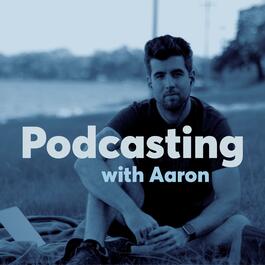
If you only need to record your own voice, or maybe a couple people in the same room, you won't have a hard time ending up with a podcast that sounds good. However, if you want to record interviews or episodes with guests or co-hosts that are in different locations, getting good sound becomes harder. You won't have any control over which microphones the other people are using, if they use good mic technique, if they know how to set input gain levels correctly, what kind of room or location they're recording in, and so on. It's always a good idea to have a conversation about someone's recording setup before you sit down for an interview or start a new podcast with a friend who lives in a different place, and that's something I'll be talking more about in the next episode. But the the software you use to record the interview or conversation is going to play a big role in whether or not you end up with audio that sounds good. You have three options for recording audio for a podcast: 1. Talk with your guests or co-hosts using a chat app like Zoom or Skype, and have everyone record audio locally on their computer or phone, then put the audio files together afterwards for editing. This is easy enough for shows with the same co-hosts every time, but not always an option if you're doing interviews with new people every week. Your guests might not be willing or able to record an audio file to a computer or phone. 2. Use the recording functionality from a chat app like Zoom or Anchor, where you end up with a single audio file that has everyone's voice in it. This is easy, but often causes issues with sound quality (more on that in a moment). This was very common in years past because there weren't any good apps that made it easy to talk to and record multiple people at the same time and get an individual audio track for each person. 3. Use an app specifically made for podcast recording, like Squadcast or Zencastr. This is the best option for most people in my opinion, as these apps allow you to talk to multiple people and will also record an audio file for each person on the call that you can put together and work on in your audio editing software later. The pros and cons of recording everyone to a single track Pros: It can be simpler, easier Less friction or work for your guest(s) Editing is less complicated (this isn't always a good thing, though) Cons: Less control over editing and mixing You can't adjust the volume levels for each speaker without doing lots of editing to move them to their own tracks The pros and cons of recording a track for every person Pros: Far more control and flexability You can edit out more You can adjust any person's gain level (how loud they are) You can do unique audio processing on each track if you need to Cons: It's a little more time consuming and complicated to edit three audio tracks at the same time instead of one If you do want to do processing for each voice, you'll need to know about EQ, compression, noise removal, and limiting (although I'd recommend learning about those things anyways if you're going to be editing your podcast) Good software costs money ($20/month for Squadcast, plus whatever software you use for multi-track audio editing, Logic Pro or Audition) So which should you choose? I believe Squadcast is currently the best and easiest way to record conversations remotely. It's not free, but it's worth the cost. If you disagree or if you have a different solution you like (there are many remote chat and recording options, like Zencastr, Cleanfeed, Zoom Pro, and so on), leave a comment on the YouTube video and let the other listeners know, or send me an email, aaron@thepodcastdude.com. Thanks for watching or listening, be sure to subscribe if you'd like to get future episodes as I publish them. If you're finding this show useful, please tell a friend about it or leave me a rating and review in Apple Podcasts. You can find more at podcastingwithaaron.com. Next time I'll be talking about what you should discuss with your guests and co-hosts before you start recording. Till then, be well and happy podcasting. Aaron
From "Podcasting with Aaron"


Comments
Add comment Feedback